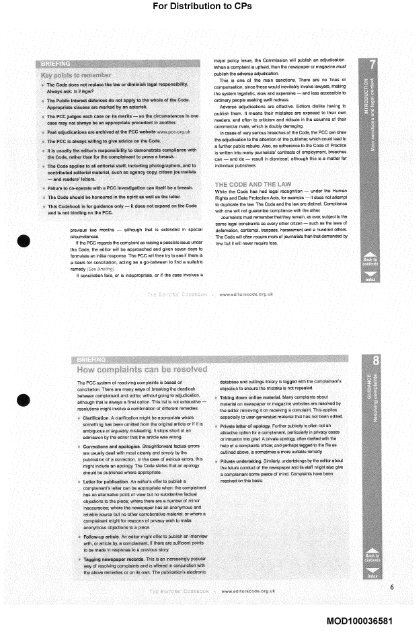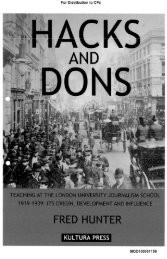The Edi ' - The Leveson Inquiry
The Edi ' - The Leveson Inquiry
The Edi ' - The Leveson Inquiry
You also want an ePaper? Increase the reach of your titles
YUMPU automatically turns print PDFs into web optimized ePapers that Google loves.
For Distribution to CPs<br />
~ ~, ~ :~ ~ ~ ~i "~ ~;:~; "!~ ~" ~; ~" ~;i)~" ~ ":~’~ ~; ~ ~?~)?: Whenmaj°r aP°l=CYcomplaintissue’is theupheld,COmmissionthen the newspaperWill publiSho<br />
° ~l Cede does not ~piabe the ~tor~i~Jntah te~al resp~na~bBi~<br />
I~’S ask: ts it/age!?<br />
This is one of the main sanctions. <strong>The</strong>re are no fines or<br />
compensation, since these would inevitably involve lawyers, making<br />
the system legalistic, slow end expensive -- end less accessible fa<br />
3 Public Inf;ere~ detentes d~ ~ot app|y {:~ {:he wh~Ile of the Cb~ ordinary people seeking swift redress.<br />
i ~ropria~e ctauses are ~arkad by an asterisk. Adverse adjudications are effective. <strong>Edi</strong>tors dislike having to<br />
PCC judges each case on i~ merits ~ sO f.~e oirc~msf-aaCes o~e publish them. It means their mistakes are exposed to their ow~<br />
¯ may ~of: al~s be an appropriate precedent; in a~ther,<br />
readers, and often to criticism and ridicule in the columns of their<br />
commercial rivals, which is doubly damaging.<br />
t adjudications are archived a{: I~he PCC websi~e ~pc~c,o~g In cases of very serious breaches of the Code, the PCC can draw<br />
![ PCC is always wi|iing to give advice o~ the Cede.<br />
the adjudication to the attention of the publisher, which could lead to<br />
a further public rebuke. Also, as adherence to the Code of Practice<br />
it usuany the ed ~r’s responsibility t:~ demo~s~rel;e ¢~mplia~o ,it~<br />
Code, rather ~han for ~he complainant 1~o preys a breach,<br />
is written into many journalists’ contracts of employment, breaches<br />
can -- and do -- result in dismisse{, although this is e matter for<br />
, ’1 , Code applies to all editorial s&arr~, inCtadi~g ph0~ogrephere, ~ to<br />
r~ributed edttorJal maltaria4 Such as agency copy, citizen jour~<br />
~nd readers’ ta~ers.<br />
individual publishers.<br />
ure to Co-oparate with ~ PCC ir~vesf4gation can itself be e bre L "~ ~ ~ ~ ~: ~ ~ "~’~;~" ~"~<br />
While the Code has had legal recognition -- under the Human<br />
.~ ’ ~ Cede should be honoure~ in the spirit as wel~ as the ~etter, Rights erd Data Protection Acts. for example -- it does not attempt<br />
s C0debeak is {or gu dance only -- it does not expend ¢~n the Code to duplicate the law. <strong>The</strong> Code and the law are distinct, Compliance<br />
I is not bindin~ on the PCCo<br />
with one will net guarantee compliance with the othe~<br />
Journalists must remember that they remain, as ever, subject to the<br />
same logo= constraints as every other citizen --such as the laws of<br />
arevlous two months although that ~s extended in special defamation, contempt, trespass, harassment and a hundred others.<br />
circumstances. <strong>The</strong> Code wil! often require more of journalists than that demanded by<br />
If the PCC regards the complaint as raising a possible issue under<br />
the Code. the editor wil! be apereached and g~ven seven days to<br />
formulate an initial rescense. <strong>The</strong> PCC wilt then try to see if there is<br />
a basis for conciliation, acting as a go-between to find a suitable<br />
remedy ISle L~r~ffng:<br />
If conciliation fails, or is inaoeroeriate, or if the case involves a<br />
law, but it will never require less.<br />
<strong>The</strong> PCC sys~<br />
conciliation, T<br />
between coral<br />
although that i<br />
resolutions mi<br />
Ctarifi¢ i¢<br />
somethi<br />
ambigu~ s<br />
edmissi ~ !<br />
COrre~ ~<br />
are usu y<br />
pu b!icat n<br />
might i~ u~<br />
should ]<br />
~ Letl.er~ ’1<br />
comptai ~r<br />
~S en :a<br />
~jectic ~’<br />
.i~<br />
liable )t<br />
th, or ,t<br />
n of resolving Complaints is based on<br />
database end cuttings library is tagged with the complainant’s<br />
re are many ways of breaking ~’~e deed ock<br />
objection to ensure the mistake is not repeated,<br />
nantandedtorwthoutgongtoadjudcaton<br />
’<br />
.....<br />
’ ~a~i~g ~own omme ma~er~ a . Man y cam an--about p ~s<br />
a ways a fine opt on Ths st e not exhaustive -- ma~er * " a, on newspa~,er ~ or m~gazl,e - -- ~s’tes weu -re a reed ed v by<br />
t nveveacambnatone dfferentremedes ..... " me eo~or remowng on ~ race v n g co a rnp~a nt . "l’hsa- ppes<br />
¯ A clarification might be ~ )propriata where<br />
especially to user-generated material that has not been edited,<br />
~s been omitted from the, -iginal article or ~f ~t ~s : Private ]Iele~er of e#ology Further publicity is often not an<br />
rarguebymseadng t~ opsehertofan ...... s<br />
attract~ opbon for e compla~cant, parflcu!edy ~n pnvecy case<br />
~he editor that the article yes wrong, or intrusion into grief A private apology, often drafted with the<br />
and apologies. Stra gh~I rward factua errors<br />
help of a complaints officer, end perhaps tagged to the file as<br />
salt with most clean y an~ simply by the<br />
outlined above, is sometimes a more suitable remedy<br />
a correct on ¯ n the case 3f ser Due error<br />
an ape ogy ¯<strong>The</strong><br />
Code s tee that an ape<br />
blished where appropriat~<br />
ths .....<br />
gy<br />
~ Private undertaking. Similarly, undertakings by the editor about<br />
the future conduct of ~he newspaper and its staff might also give<br />
a complainant some peace of mind. Complaints have been<br />
blioatton. An editor’s off~ "to publish a<br />
resolved on/;his basis.<br />
letter can be app~opriat, when: the car ~inant<br />
ative point of view but no ~ubst~ntive ta~ ~1<br />
the piece; Where there el = a number of ~or<br />
where the newspaper h~ ~ an anonymo~ md<br />
;e but no other corr0bore ce matadat; of<br />
might for reasons of priv~ :y ~ish to ma~<br />
)bje~ione to a piece,<br />
=ere a<br />
¯ iCie. An editor might ~ "to publish an erview<br />
e bY, a complainant, if th~ ~e are sUfficier 3int~<br />
q res#on~ to e previous ~ory.<br />
~ggln<br />
ay of<br />
n<br />
s,<br />
~ap~per records, Thls Is m JncreasJngI!)pUlar<br />
ring cemplainta a~d is off red i~ conjunc ~ with<br />
e~bC .=) readies or on its own. Th~ publication’s e ~renic<br />
MAD100036581
















